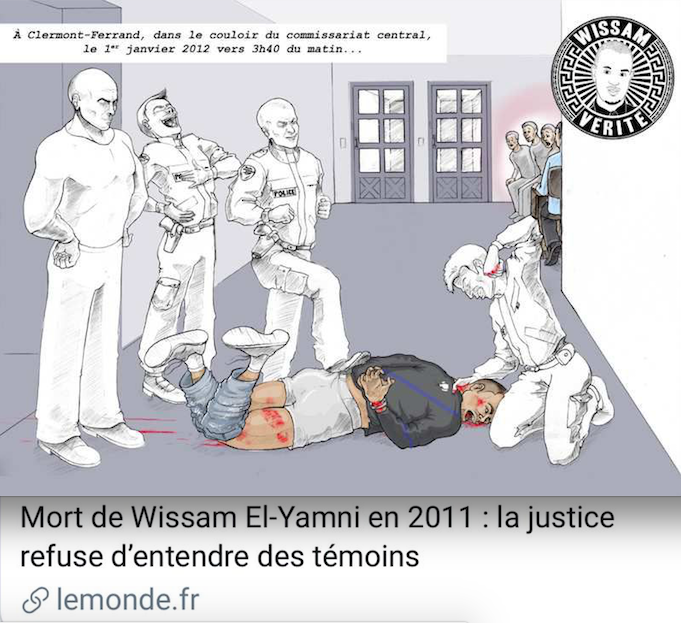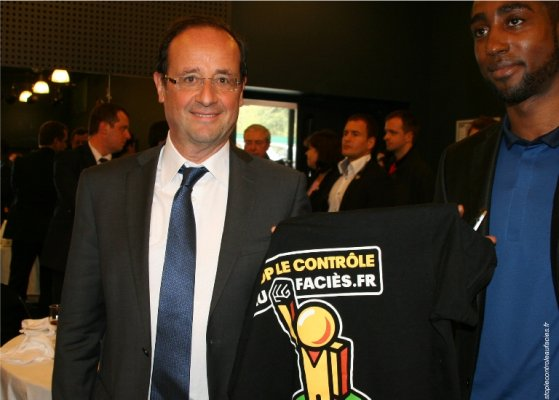http://news.yahoo.com/many-countries-police-rarely-guns-heres-why-133142635.html
"
In Many Countries, Police Rarely Use Their Guns. Here’s Why
The officer, alert but cautious, pounds on the suspect’s door. “Polizei!” he says forcefully, in his native German. A man thrusts open the door and walks out. His hands are at his sides, but the policeman notices a gun tucked into the man’s belt. He pulls out his own firearm in response. He then moves briskly backward, coaxing the man to place his weapon on the ground.
The cop is commended for his actions.
The next officer up bangs on the same door. “Polizei!” he says. This time the person walks out carrying a baton, not a gun. So the cop doesn’t pull out his pistol. Instead he brandishes a can of pepper spray—a reflex response that also garners praise afterward.
The scene here, in what looks like an outdoor movie set, seems like basic enough training at almost any police academy in the world. But today’s course for new recruits in the Ruhr Valley in western Germany represents just one small part of an educational process that will last for three years, during which the officers will be drilled in alternatives to pulling a trigger. Today’s shooting training is subtitled, tellingly, “Don’t shoot.” And it’s far from the only lesson they’ll receive in restraint. Each recruit earns a bachelor’s degree as part of basic police training—a requisite before getting a badge and a beat.
Those in charge of this vast complex in Selm, in the German state of North Rhine-Westphalia, say the rigorous education standards help to widen an officer’s vision when stress narrows it—when he or she has only seconds to consider how to confront a menacing suspect.
“In every head of every policeman, there is the aim not to shoot,” says Col. Uwe Thieme, the four-star senior police director at the state’s office for education, training, and human resources. “We try to make all police officers recognize that you are not a good guy if you are shooting. You are a good guy if you are not shooting.”
The message is sinking in. In a nation grappling with neo-Nazism, new displays of intolerance against immigrants, and the threat of Islamic terrorism, German police rarely pull their guns. So far this year, researchers have tallied four fatal shots fired by police. In the United States, there have been more than 400.
Nor is Germany alone. Around the world, police shootings are a rarity in many industrialized nations—even some with serious crime problems. For instance:
Now, as a handful of highly publicized police shootings fray already taut relations between police and black communities in the United States, experts and law enforcement authorities are searching for ways to solve a pressing social problem—and wondering whether other nations might hold lessons in how to do it.
America, to be sure, is a different country. Some argue that the ubiquity of guns in the U.S. is a major reason that many seemingly innocuous incidents escalate into fatal shootings. At the same time, racial tensions are more pronounced than in many other countries. Yet, analysts believe that other nations have adopted a number of practices that contribute to less-contentious relations between police and residents that might make a difference on U.S. streets. These range from more rigorous police training, to changing the way officers interact with residents, to requiring more education for cops.
“In Germany, a gun is not sexy; it is not part of [a police officer’s] masculinity,” says Joachim Kersten, a professor at the German Police University in Muenster, noting that knowledge is the key to defusing tense situations. “If [police] have to be dominant in a situation, they don’t need a gun for that.”
___
To this day, one of the most curious spectacles in all of policing is the sight of a British bobby sans weapon.
In the 1990s, as American cities were adopting the “broken windows” theory of crime-fighting—the idea that clamping down on minor infractions will help stamp out major ones—Britain began debating more aggressive methods of policing too. Yet, with few exceptions, a “zero tolerance” approach didn’t prove popular with British police, who viewed it as heavy-handed and indiscriminate. In fact, police in London were taught from the beginning to be anything but aggressive.
The bobbies—the name given to the Metropolitan Police—were created in 1829 by Home Secretary Robert Peel at a time when the military was feared. The police force, at its core, was, and still is, seen to serve the community and fight crime by consent rather than serve the state. That’s why bobbies were given a smart blue uniform, not red, the color of the militia’s. Even today, they can be seen in Prussian helmets carrying batons, not guns.
The threat of terrorism, not to mention the number of guns flourishing on the black market, has sparked a recurring national debate about whether Britain’s police should begin to carry firearms. But the police themselves have been the first to oppose such a move, even in the heat of the London bombings in 2005. A survey by the Police Federation in 2006, the latest available, found that 82 percent of its 47,238 members did not want officers to be routinely armed on duty, despite almost half saying their lives had been “in serious jeopardy” during the previous three years.
“Having police officers patrolling neighborhoods and being routinely armed could be seen as a more military type of police service, which is unlikely to be supported by either the police or the public,” says Steve White, a former firearms officer and chair of the Police Federation, which represents rank-and-file officers.
Nevertheless, the image of the cheerful bobby in Britain has taken a hit in recent years as the force has been accused of discrimination and acting with impunity. Police killings in Britain are extremely rare, but when they happen, they’ve sparked riots on the scale of what America has seen in Ferguson, Missouri, and in Baltimore. The slaying of gang member Mark Duggan in 2011 led to protests in North London that spread across the country.
But such incidents tend to reinforce the belief among many British residents that guns are not the solution. “Violence breeds violence,” says Patsy McKie, a mother of three whose youngest son, Dorrie, was killed in August 1999 during a spate of shootings in Manchester. “Criminals and drug dealers would want to defend themselves if they thought policemen were always carrying guns.”
So Britain has worked out a solution that is largely viewed as the right balance between keeping policing community-oriented and keeping the nation safe, says Peter Squires, a professor of criminology and public policy at the University of Brighton. While most “bobbies on the beat” do not carry guns, armed police are never far away. Armed response teams and vehicles often patrol or are on standby. It’s the classic “British compromise,” Squires says.
___
Yet even where guns are routinely carried, their use is far rarer in Europe and some other English-speaking countries than in the U.S. Many experts link that partly to education and pay, which have turned policing into a well-respected career with prestige and perks. In the U.S., police training lasts, on average, 19 weeks. In much of Europe that would be unthinkable, says Kersten. German police, for example, train for at least 130 weeks.
In fact, since 2008 in North Rhine-Westphalia, becoming a police officer means a stint at a university, sitting in law classes, learning about the cultural customs of Muslims, and debating ethics.
Outside the classroom, during training activities such as target practice, recruits are surrounded by messages urging prudence. “Super shooting, I hope you never need it in real life,” reads one poster at the facility in Selm. Another lists the number of times police fired their guns each year up to 2010. In that year, there were 9,450 shootings. Of those, 9,342 involved animals.
The lengthy training regimen in Germany doesn’t seem to discourage people from wanting to become cops either. Some 8,000 candidates competed to join North Rhine-Westphalia’s 40,000-strong force. Only 1,640 spots were available.
North Rhine-Westphalia’s emphasis on higher education was identified as a “best practice” that could be applied to police departments in the U.S. by the RAND Corporation, a think tank, and the Bureau of Justice Assistance, an arm of the U.S. Department of Jutice, in 2012. “It’s in everyone’s interest for police out there to have bachelor’s degrees,” says Rob Davis, the chief social scientist at the Police Foundation in Washington, who cowrote the report.
___
Money is another factor that many experts believe could help improve the quality and professionalism of police forces. In few places is that strategy more apparent than in Canada, where police command some of the best law enforcement salaries in the world. Pay there often tops six figures a year.
Figures from Statistics Canada, a government agency, show that police officers are paid, on average, more than many well-respected white-collar professionals, including elementary school teachers, registered nurses, and social workers—all of whom must have college degrees, unlike police. A government list of public employees earning more than $100,000 in Ontario, Canada’s most populous province, revealed that more than half of the Toronto Police Service earns six figures when counting overtime pay.
That has drawn men like Sgt. Peter Leon to its ranks. He joined the Toronto police force 27 years ago, the summer after graduating from a university with a degree in history and political science. He says police officers view their work as a career rather than a job, with good benefits and opportunities to advance. “Everybody comes on as a front-line uniform patrol officer, and there’s opportunities to specialize in different things,” he says.
The force here, like elsewhere, is not without its controversies. Some high-profile accusations of abuse in Canada in recent years have sparked calls for increased accountability and led the Toronto Police Service to launch a pilot program in May that entails 100 officers wearing body cameras, just like many of their U.S. counterparts.
But higher salaries might be as effective as a video lens in curbing police misconduct. Money can attract recruits with “soft skills” and postsecondary education, says Irwin Cohen, Royal Canadian Mounted Police research chair at the School of Criminology and Criminal Justice at the University of the Fraser Valley in British Columbia. Departments want officers with these qualities because they are better able to deal with confrontation and the public.
“Now police are recruiting people with great communication skills and empathy skills, and [who] have a good understanding of psychology and sociology, because we’re realizing more and more that that’s the more effective kind of police officer,” Cohen says. “Your most important tools as a police officer are usually not the ones that are on your belt anymore, but that are in your brain.”
___
One of the main recommendations to come out of a commission appointed by the Obama administration in the wake of the latest law enforcement crisis is a revival of “community policing.” In many ways, Japan has been perfecting this concept since 1874. Proof of this sits off a main street in Sakura, on the outskirts of Tokyo.
There, the koban, a mini police station, is located near the railway station, a bank, a bakery, and a bento shop. It’s nothing special. It’s even a bit drab. But like the 6,000 others across Japan, its doors are transparent, so visitors can peer in and police can peer out.
Japanese police officers won’t even reach for their guns if they get hurt, says Hidehiko Sato, a former commissioner general of the National Police Agency. When they do, it is only because “they have absolutely no other means.”
It doesn’t hurt that Japanese police rarely find themselves in threatening situations to begin with. They are working in one of the least violent societies in the world, not to mention one of the most homogeneous. Japan has the second-lowest homicide rate after Singapore, according to United Nations figures, with 370 homicides in 2013, compared with 16,121 in the U.S.
Community-police relations are also more peaceful because, in Japanese society, citizens defer to the authority of law enforcement officers.
But a society still fixated on hierarchies also helps keep police power in check. A police officer involved in an unjustified shooting would be automatically demoted, Onagi says. The officer and even the person’s bosses “would feel an invisible pressure and be often relegated to a lower position,” he adds.
___
Still, policing by nature is always going to involve some tension between cops and residents. In many Latin American countries, such as Brazil, where standards are often low and consequences for misconduct nonexistent, police kill far more suspects than their American counterparts. Even in countries with relatively few shootings, authorities face challenges.
In France, for instance, many Muslims harbor little trust in the police. This is particularly true among the poorer immigrants living in the banlieues, or outer suburbs, of major cities.
On a recent evening, as thick rain clouds menaced the sky, a group of protesters gathered in a Parisian banlieue to protest a judge’s acquittal of the police in an infamous case from 2005: Several teenagers fleeing police ran into a utility substation, and two of them were electrocuted. Their families wanted the police to be held responsible for their deaths. “There is no accountability,” argues Moroccan-born Farid El Yamni, an engineer, who says that his brother was killed in 2012 by French police.
Studies show the French trust their police less than people in some other European countries, including Britain and Germany, trust theirs. “The French police are not predominantly preoccupied with their relationship to the people but their relationship to the state,” says René Lévy, the director of research at the National Center for Scientific Research, who wrote the book History of the French Police.
As a rush of asylum seekers and economic migrants arrive in Europe, fleeing war and poverty in their own countries, many believe the police-citizen strains will only increase. In Germany, a recent case of police abuse against migrants in Hanover generated national scrutiny.
Yet, even the German police’s toughest critics say this case is an exception. Alexander Bosch, who heads the policing and human rights section for Amnesty International in Berlin and trains police throughout Germany, says that, even though racial profiling is a common problem, the “German police are quite good.” They regularly rank in surveys as the nation’s most trusted institution.
In a gritty section of Dortmund, a major city in North Rhine-Westphalia, Abir Hichem, who is Moroccan, walks down a street lined with teahouses and Internet cafés. As a minority, he says he trusts the police. If he had a problem, he’d turn to them.
Lawyer Norbert Zohn is complimentary of cops too. In fact, he says something that would surely be envied in many American cities. “The presence of police officers does lead to calm,” he says. “It makes you feel safer.”
/image%2F1527421%2F20161022%2Fob_5f2a1f_graphic-affiche-noir.jpg)








